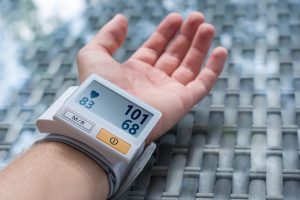
Previous studies in older adults with hypertension have shown mixed results, and guidelines recommend different target levels. These trials specifically set out to examine whether intensive treatment targeting systolic blood pressure below 130 mmHg could reduce the risk of cardiovascular disease compared to those with a reading below 150 mmHg.
But with more than one billion people with hypertension worldwide, understanding treatments for the condition is vital. Elevated blood pressure is the leading contributor to premature death globally.
A Sedentary Lifestyle
The overall prevalence in adults is around 30-45%, which rises to around 60% of those over 60 years. As people age and adopt a more sedentary lifestyle, they also increase body weight, leading to hypertension.
The study included 8,511 older essential hypertension patients from 42 clinical sites in China. All participants had systolic blood pressure (SBP) of 140 – 190 mmHg and were aged between 60 – 80 years. Patients with prior stroke were excluded.
Participants were randomly divided into one of two groups. The first group followed intensive treatment, and the second received standard treatment. Each participant was scheduled for follow-up at 1, 2, and 3 months, and every 3 months thereafter until month 48.
During the 3.34 year follow-up period, there was an average decrease in systolic blood pressure of 19.4 mmHg from baseline in the intensive treatment group. In the standard group, the decrease was 10.1 mmHg from baseline.
There were 196 primary outcome events documented in the standard treatment group, compared to 147 events in the intensive group. When documenting secondary outcomes, intensive treatment was found to be associated with a 33% lower relative risk of stroke and a 33% lower risk of the acute coronary syndrome.
The primary outcome of hypertension was a composite of stroke, coronary syndrome, acute decompensated heart failure, coronary revascularization, atrial fibrillation, or death from cardiovascular causes.
The secondary outcomes included the components of the primary outcomes, death from any cause, major adverse cardiac events, and renal outcomes.
Principal investigator Professor Jun Cai said that “active control of SBP to below 130 mmHg in older hypertensive patients, as compared with below 150 mmHg, resulted in a lower incidence of major cardiovascular events, with no increase in renal injuries. Home blood pressure monitoring more accurately reflected long-term fluctuations in blood pressure than office measurements.”